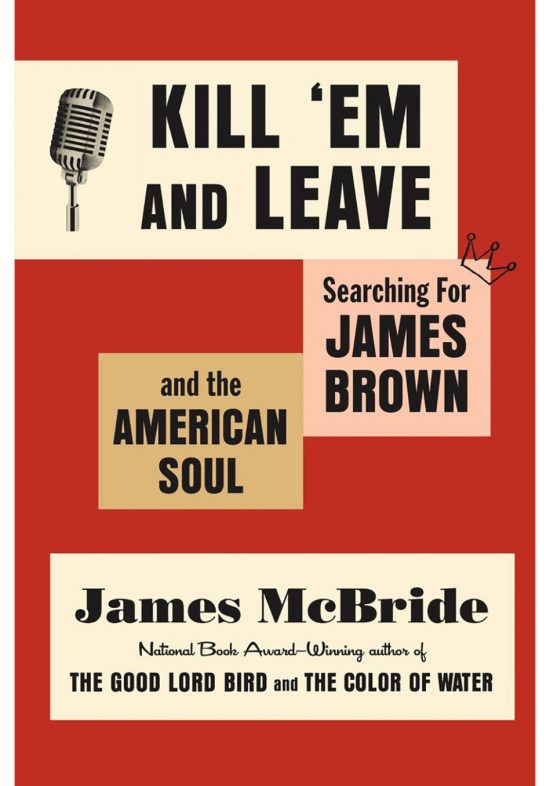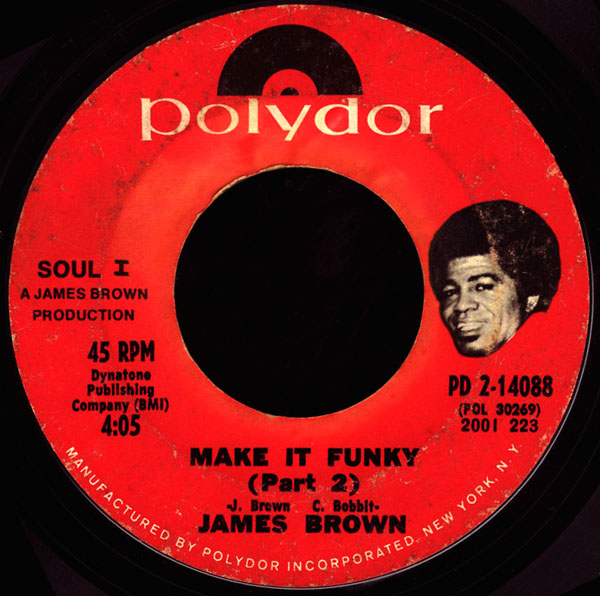Is James Brown the most influential American musician of the 20th Century? He’s certainly in the conversation along with Louis Armstrong, Bob Dylan and Michael Jackson. His story—the undeniable musical legacy as well as the catastrophic events following his death in 2006—is brilliantly evoked in James McBride’s riveting book, Kill ‘Em and Leave. McBride, an accomplished musician and award-winning author, is the ideal guide to take us through the intricacies of Brown’s life, the towering musical accomplishments, and the bitter, enraging legal mess that has tied up Brown’s estate. It was Brown’s wish to leave the majority of his fortune—which McBride reports was conservatively estimated at $100 million—to poor children in South Carolina; so far, none of it—not a cent—has reached its intended destination.
McBride took a few moments out of his busy schedule to talk with us about Brown, why he wrote the book, and how our country continues to devalue our greatest cultural export.
Alex: I remember reading the second volume of James Kaplan’s Frank Sinatra biography last year and his daughter said that Sinatra was incapable of having intimate relationships. In your book, one of James Brown’s closest friends says, “He did not believe in letting people get to know him.”
James McBride: Yeah he did not want to be known. He was a lonely man.
Alex: What drew you to write this book?
JM: I just felt an obligation to do it because of who he was and who he is. If it was anyone else I wouldn’t have gone through all that trouble, believe me. Because he was special.
Alex: You mention that Lionel Hampton and Louis Jordan were big influences on Brown and that their careers were hurt because their styles never changed. And that was something Brown avoided for a long time.
JM: He evolved. He learned about evolution—which was a very valuable lesson to him. He learned how to change. Mr. Brown was really smart in that way. He really understood that you had to continually evolve to survive in the record business. He was really quite ahead of his time in that way. The past gobbled up his predecessors and he didn’t want it to swallow him, although it eventually did. The thing that really swallowed him is history and the American entertainment industry, which eats its young—of all colors.
Alex: And he had a longer run than most.
JM: He changed American music. He had a wonderful run. But everyone’s run ends.
Alex: There is so much that is disturbing about Brown’s story, particularly since he died and his estate has been such a mess. At one point you quote Brown as saying “I’m angry and spent.” That spirit—of fatigue and rage—permeates the entire book.
JM: Well you can’t witness this kind of history and be happy. If you are then there’s something wrong with you. You can’t witness this kind of history and be pleased. I’m not an unhappy person at all but I can’t say that I’m pleased with how American Cultural history has treated black musicians. In terms of being helpless witnesses to how American cultural racism plays out. I think black musicians are among the foremost victims of how America’s cultural machinery eats African American life alive and then sells it at a discount for a chosen few. So it’s not a book of jokes. On the other hand, it doesn’t spare black musicians either. David Cannon [Brown’s white lawyer] is the biggest character in the book other than James Brown and he went to jail for nothing. He really did nothing wrong. He’s a victim of racism as well.
Alex: One of the most telling lines in this book is something that James Brown told Charles Bobbit, his longtime fixer: “It’s gonna be a big mess when I die, Mr. Bobbit. A big mess. Stay out of it.”
JM: He predicted it properly. Now, it’s about unraveling that mess, trying to spring that money for those kids, which is part of the purpose of [writing the book]. I’ve done my job, now maybe the Federal Government needs to get involved. The State of Georgia needs to get involved. I’ve written what I think is an accurate book that portrays some of the problems that Mr. Brown faced in his life and I’d like to see somebody else interested instead of just me. There’s a lot of money involved here. There’s two-and-a-half generations of kids who have not benefitted from Mr. Brown’s money. The only people who have benefitted is a bunch of lawyers. Actually, I’m not angry, I’m just telling the truth. The truth is just a straight line: The guy left a bunch of money to educate these children and the state of South Carolina has not made it happen. They stretch the story every way but the way it should go, which is how lawyers operate. They tried to re-write the guy’s will. Would they try to re-write the will of Elvis Presley or John Lennon? They would never do that. This is an injustice. He wanted his money to educate children of all colors and it should happen. I mean the truth is James Brown’s life was a tragedy but it was a good tragedy, it changed American music, and he brought a lot of people happiness.
Alex: Do you think it’ll ever get sorted out?
JM: I don’t think it’s going to happen anytime soon.
Alex: How did you arrive at the structure for the book, which is a series of portraits of some of the people who were closest to Brown?
JM: Every story comes at you a different way and you just have to go with what’s there. You play the song with the instruments that are in the room. Those were the instruments I had. There’s no other way to do it. That’s what I had so I had to use that. If there was another way to do it I would have done it another way but there was just no other way to do this book—that was fresh and different. I had to use the voices of others and then add my own voice. It was a big band song. It was a very difficult book to do. You can’t let the audience let you see your lips move you just got to make it seem effortless.
Alex: The chapters on Pee Wee Ellis and Al Sharpton were especially riveting.
JM: When you hear Al Sharpton speak you’re really hearing James Brown. He had a big effect on Al Sharpton. Sharpton was there for 15-18 years sitting at James Brown’s feet. Al Sharpton reflected James Brown’s thinking on race and entertainment and everything. He reflected James Brown’s attitude, his culture, his social beliefs, his desire to better the race and to speak out against social injustice—or perceived social injustice.
Alex: Ellis was a terrific middleman between Brown and the band during Brown’s greatest years in the mid-to-late-1960s. Can you make a comparison between Brown as a bandleader and Duke Ellington, who was brilliantly able to take elements of each musician and mold them into something really great?
JM: Brown was more like Count Basie in terms of how he approached his band because he wanted his band to be really tight. The Basie band was known to be really tight. They weren’t known to have the kinds of soloists that the Ellington band had. He’s a little bit of both: he used his players like Ellington but he demanded Basie’s tightness—that strength of sound.
Alex: I also really appreciate the passage where you describe the difference between playing jazz and funk is like the difference between playing basketball and baseball.
JM: Basketball requires a certain set of skills that are akin to playing jazz. You have to dribble, shoot—from 15 feet, from 20 feet with a guy bigger than you sticking a finger in your eye and calling your mother names as he’s pulling your shorts down with one hand—you have to have speed and jumping ability. And that’s jazz, which requires all kinds of technical and harmonic knowledge in order to make it go. Everything has to be right—tempo, harmony, your knowledge of theory and the ability to translate it to your instrument in the proper framework and proper time. Whereas funk is like baseball. You can’t hit an 80 mph curveball without having been taught, without having to practice it no matter how good an athlete you are. Ask Michael Jordan. You just can’t do it unless you’ve been trained to do it. And that’s funk, which requires the use of space. Space is something that a lot of musicians don’t really learn how to work with. With funk you put your little thing in there and then you have to do it consistently, every time.

Alex: The space you talk about being difficult for some musicians. Can you say the same thing about writers who may be afraid to be understated, afraid to leave too much out?
JM: I think it’s the same thing. Some guy writes a 350-page book on roasted garlic and it says nothing. Another guy writes a five-page treaties on the same subject knocks it out the yard. You have to know how to play the instrument. You have to know how to tell the story and what seeds to use and what characters to shuffle around. Writing a story is like playing a pinball machine. The ball is going to go down the hole at some point. How are you going to make it go? Where’s your skill set to make it go the way you want it to go?
Alex: You knew a good deal about Brown, and certainly his music, when you set out to do the book. Was there anything you learned that you didn’t know that stands out?
JM: I didn’t know that he was religious. He had the bible opened to the Book of Psalms at his house. He liked to quote the bible. He wasn’t considered religious but music writers and critics but he was. He was really trying to be close to God.
This conversation first appeared at The Daily Beast.
